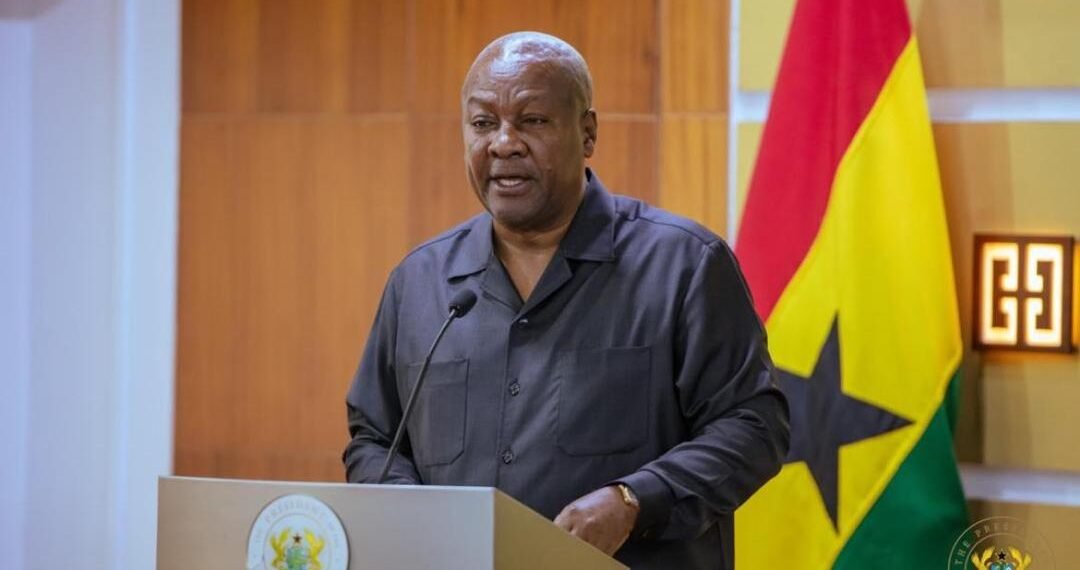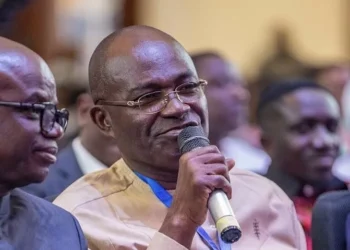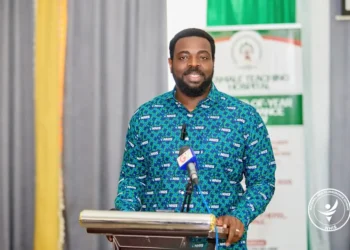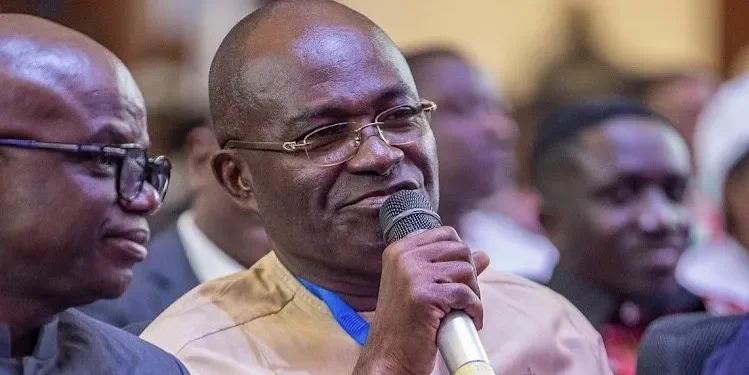Ghana’s President HE John Dramani Mahama has reaffirmed his administration’s commitment to comprehensive structural reforms as the cornerstone of Ghana’s new economic vision, marking a significant pivot in the country’s recovery efforts.
Speaking at the presentation ceremony of the final report of the National Economic Dialogue at the Jubilee House, President Mahama described the dialogue as “not an academic exercise,” but a necessary intervention to rescue a nation grappling with high debt, inflation, unemployment, and public disillusionment.
“This occasion is significant because it concludes a far-reaching national conversation on our economic future and begins a new phase of implementation rooted in our collective insights and our shared commitment”.
HE President John Dramani Mahama
The event, which capped a three-month consultation under the theme “Resetting Ghana: Building the Economy We Want Together,” brought together key stakeholders including public institutions, private sector players, trade unions, civil society organisations, academia, youth leaders, and international development partners.
The President hailed their technical contributions, candour, and patriotism, noting that the final report reflects a strong national consensus on actionable solutions to restore economic stability and drive resilient, inclusive growth.
“When we initiated this dialogue, we were under no illusion about the gravity of the economic crisis we had inherited; record-high debt, runaway inflation, high unemployment, and a complete loss of confidence in the economy’s governance.
“The final report presented today reflects a broad consensus on what needs to be done to stabilise our economy, restore investor confidence, and put our country on a path of inclusive and resilient growth.”
HE President John Dramani Mahama
The report, according to President Mahama, offers practical, homegrown policy recommendations across ten priority areas, which he noted have already seen implementation by his administration.
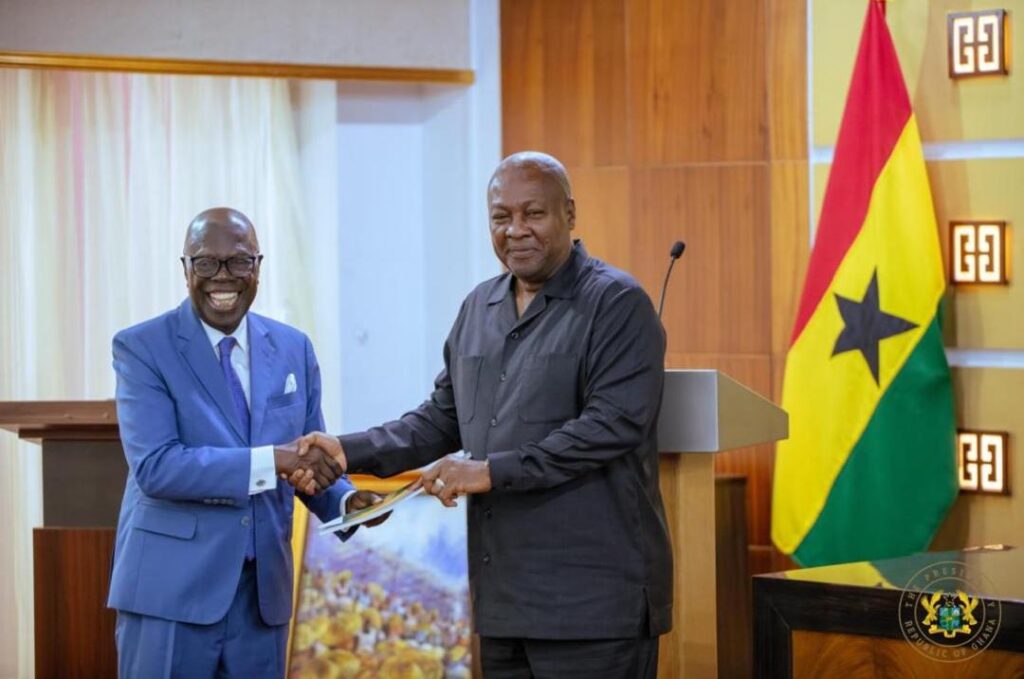
Fiscal Discipline and Governance Transparency
At the heart of President Mahama’s economic reset agenda is a bold fiscal policy reform. Recognising that no sustainable progress can be made without restoring confidence in public finance, President Mahama noted that his government has amended the Public Financial Management Act to introduce a legally binding debt ceiling.
This measure, President Mahama said, aims to lower Ghana’s debt-to-GDP ratio to 45% by 2028. To ensure compliance and maintain credibility, the President assured that an independent Fiscal Council will be established by the third quarter of this year.
The council, he noted, will function as a nonpartisan oversight body, charged with monitoring fiscal operations and publishing public assessments to keep the government accountable to the people.
Reforms in the Tax Regime
Acknowledging the current tax system as overly complex and burdensome, President Mahama announced the repeal of several “punitive and counterproductive” taxes within his administration’s first ninety days. These include the Electronic Transfer Levy (E-Levy), the Emissions Levy, and the Betting Tax.
In their place, President Mahama indicated that a rationalised and streamlined tax system is being designed to promote fairness, encourage business growth, and enhance voluntary compliance.
“After stakeholder consultation and parliamentary review, these changes will take effect from September 2025. Our goal is to have a leaner, simpler, pro-business tax framework that supports growth and compliance.”
HE President John Dramani Mahama
A Productive Economy
Turning attention to the country’s development model, President Mahama asserted that “no nation has taxed or borrowed its way to prosperity.” As such, his administration is launching a flagship 24-hour economy programme to stimulate production and industrial output.
Key sectors targeted include agro-processing, manufacturing, logistics, healthcare, pharmaceuticals, and public safety.
“Firms operating in second or third shifts will benefit from fiscal incentives, utility discounts, and labour support schemes. This approach will help us expand job opportunities, reduce youth unemployment, and increase output with significant new capital outlay.”
HE President John Dramani Mahama
Additionally, the Ghana Export Promotion Authority has been tasked to implement an accelerated export development strategy, aimed at increasing non-traditional exports to $10 billion by 2028.
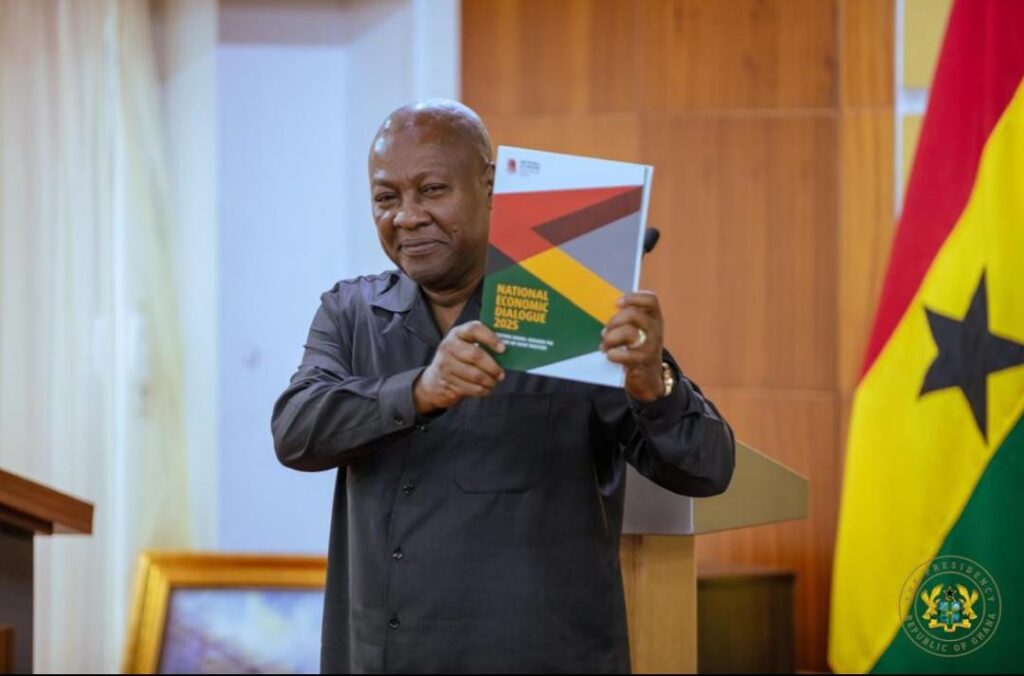
This will be bolstered by improvements in trade facilitation, automation, and the establishment of new export zones.
Addressing Structural Barriers and Labour Market Mismatches
President Mahama was candid about the deeper structural challenges plaguing Ghana’s economy, especially in education and public service delivery. “Our educational outcomes are increasingly disconnected from labour market needs,” he lamented.
To bridge this gap, President Mahama noted that the government is finalising a Public Sector Productivity and Reform Strategy, which will be launched in January 2026.
This strategy, according to him, will involve rationalising overlapping state institutions, digitising services, and aligning skills development with industry needs through the National Skills Development Authority.
The focus, President Mahama stressed, will be on equipping young people for real-world jobs, not just conventional job titles.
Toward Accountable Economic Governance
The President outlined a governance reset to ensure transparency, openness, and public trust in the implementation of economic reforms. He directed the Ministry of Finance and the National Development Planning Commission to issue bi-annual reports on the implementation status of the dialogue’s recommendations.
In a move to further institutionalise accountability, President Mahama announced that a multi-stakeholder annual review of the dialogue’s progress will become a permanent fixture.
Furthermore, President Mahama pledged that his administration will institutionalise multi-stakeholder review of the country’s medium-term development plans and strengthen parliamentary oversight over public spending through enhanced audit and disclosure mechanisms.
“Fellow citizens, the final report of the national economic dialogue is more than just a policy document. It is a covenant between government and the governed, between evidence and action, and between vision and results”.
HE President John Dramani Mahama
Institutional Coordination and Public Engagement
To ensure efficient and inclusive implementation, President Mahama will issue an executive directive establishing an inter-ministerial implementation committee, which will include private sector and civil society observers. This committee is expected to deliver its first public bulletin by August 2025.
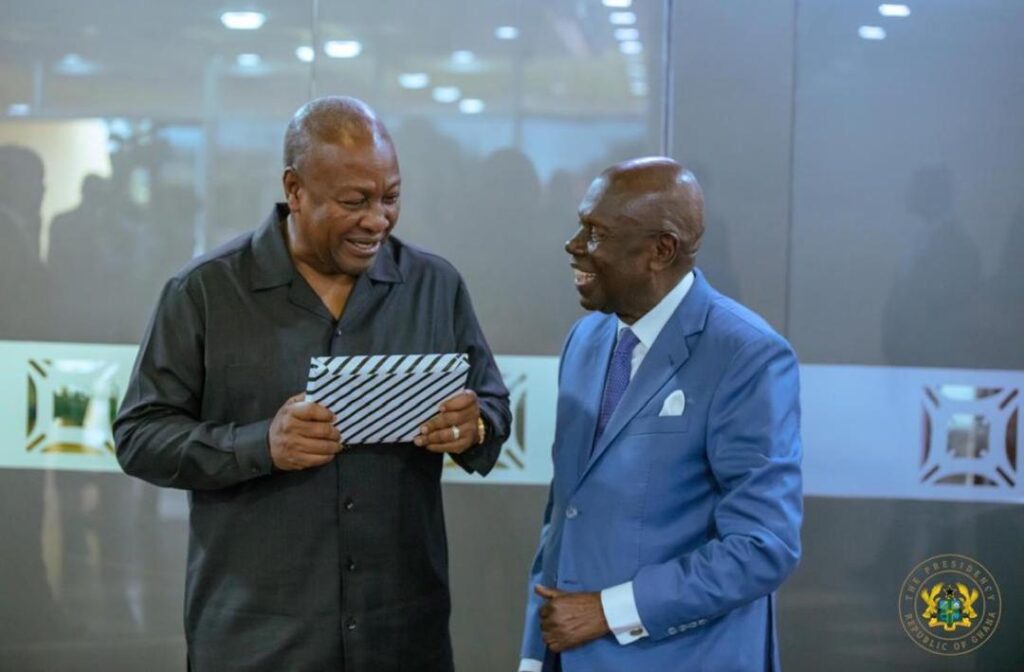
In his closing remarks, President Mahama expressed gratitude to Dr. Ishmael Yamson and the planning committee for their pivotal role in steering the dialogue. He also thanked organised labour and the Ghanaian people for their patience and faith in the reset agenda.
“We ask Ghanaians to trust this process, and you did. Today, I reaffirm our end of commitment, we’ll implement these reforms with honesty, urgency, and discipline. We’ll govern not in secrecy but in openness. We’ll place national interest above every narrow consideration.”
HE President John Dramani Mahama
The President concluded with a rallying call to national unity and action. “Let us reset Ghana—not with words but with action. Let us build the economy our children deserve. May God bless our homeland, Ghana, and make our nation great and strong.”
President Mahama’s acceptance of the National Economic Dialogue Committee’s report marks a daring and proactive response to Ghana’s persistent problems as the nation starts a new phase of economic transformation.
There is currently a roadmap in place, and a commitment has been made, and it is the hope that the same is followed to ensure suggested reforms will result in a true economic revival.
READ ALSO: Mahama Rallies Support for ESLA Increase, Assures Prudent Use, Stable Power Supply



